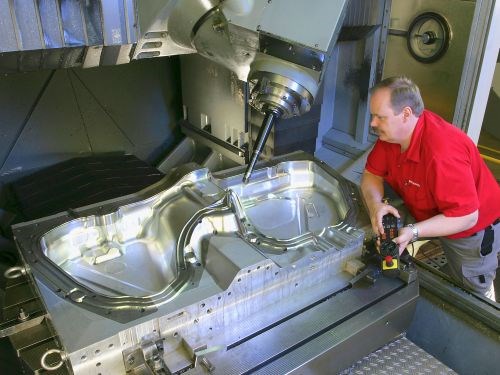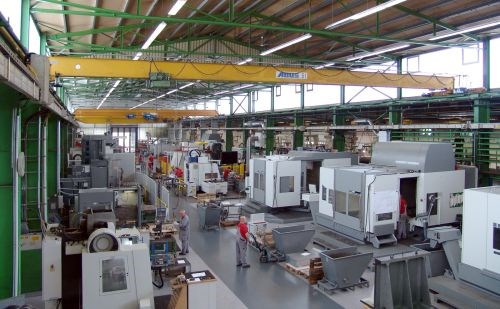Banking on Expertise
This German manufacturer of automotive tooling relies not only on technology, but also the knowledge and expertise needed to assist customers beyond just on-time delivery of quality parts.
Share

Although most of Meissner’s business consists of foundry tools, it also manufactures tools for car trim parts as well as blow molds like the one shown here. This particular blow mold is for an automotive fuel tank. (Photo courtesy of Meissner AG).
It’s not often that MoldMaking Technology gets an up-close look at foreign tool and die manufacturers, but I had the opportunity to do just that during an excursion away from the Euromold show this past December in Frankfurt, Germany. At Meissner AG, a manufacturer of automotive industry foundry tooling, blow molds and tools for car trim parts, the shop floor was impeccably clean and organized. And, according to my tour guide, key account manager Marcus Bӓcker, the average age of the company’s machine tools is only five years.
However, technology is far from the only key to Meissner’s success. Also critical to competitiveness is the company’s drive to act as much like a consultant as a parts supplier, says President and CEO Tilman Lӧffelholz. Increasingly, customers for the foundry tool division—which accounts for about 60 percent of sales—consist of relatively new companies in countries like Mexico and Russia. Meissner’s knowledge and expertise is particularly critical for serving these foundries, which lack the experience of counterparts in traditional markets like Western Europe, he says. In fact, Meissner often sends teams of its own personnel to customers’ sites in order to train them on using the tools it supplies. In one recent example, a team of engineers trained a Turkish customer in the use of a complex pneumatic robot gripper. This training was critical because the gripper could easily break if the customer followed the wrong procedure to secure the large foundry tool for which it was designed. Lӧffelholz says the goodwill that this on-site service builds with customers is more than worth the expense.
He attributes part of the company’s ability to provide such services to its emphasis on increasing in-house engineering capability. In the past decade, the number of CAD seats has climbed from 30 to more than 60. This focus on the front end of the process enables the company to address customer concerns from the outset. In one recent example, the company helped a customer develop a process for incorporating peripheral components into automotive fuel tank as part of the blow molding process rather than adding them later. Although the resulting mold was more costly, the expense was offset by significant time and cost savings for the customer.
The fact that Lӧffelholz and Bӓcker were so eager to talk about the company’s knowledge and expertise struck me as telling. Granted, my visit wasn’t long enough to really dive into the company’s technology and processes—and, in any case, they might not have wanted to give too much away to a foreign journalist. Nonetheless, the company’s emphasis on engineering and service is tangible evidence that for Meissner, technology alone isn’t a panacea for success. That could serve as a lesson for manufacturers facing many of the same problems and competitive pressures on this side of the pond.
Finally, Meissner wasn’t the only company I had the opportunity to visit during that trip to Germany. Aside from its focus on automotive tooling, Heck and Becker is a very different company. Nonetheless, the importance of knowledge was on full display there as well. Read this article to learn more.

The fact that Meissner sent me this photo (I wasn’t permitted to shoot my own) might lead some readers to assume it was staged to some extent. Having been there in person, I can tell you that’s not the case—the shop floor really did look this clean and organized.
Read Next
Are You a Moldmaker Considering 3D Printing? Consider the 3D Printing Workshop at NPE2024
Presentations will cover 3D printing for mold tooling, material innovation, product development, bridge production and full-scale, high-volume additive manufacturing.
Read MoreHow to Use Strategic Planning Tools, Data to Manage the Human Side of Business
Q&A with Marion Wells, MMT EAB member and founder of Human Asset Management.
Read MoreHow to Use Continuing Education to Remain Competitive in Moldmaking
Continued training helps moldmakers make tooling decisions and properly use the latest cutting tool to efficiently machine high-quality molds.
Read More







.jpg;maxWidth=300;quality=90)











